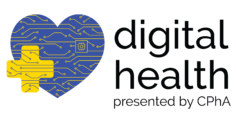Digital Health Corner Editor: Parisa Vatanka, PharmD, CTTS
 Digital Health can appear quite overwhelming for pharmacists unfamiliar with the landscape. Perhaps one of the easiest ways to approach the subject is to treat Digital Health as an umbrella term that encompasses multiple areas that may already be familiar to you. This can include Health Information Technology (HIT) such as electronic medical records and e-prescribing or virtual care visits via telehealth/telemedicine. Newer categories that have emerged include apps, wearables, sensors, and digital therapeutics.
Digital Health can appear quite overwhelming for pharmacists unfamiliar with the landscape. Perhaps one of the easiest ways to approach the subject is to treat Digital Health as an umbrella term that encompasses multiple areas that may already be familiar to you. This can include Health Information Technology (HIT) such as electronic medical records and e-prescribing or virtual care visits via telehealth/telemedicine. Newer categories that have emerged include apps, wearables, sensors, and digital therapeutics.
Mobile apps are perhaps one of the most ubiquitous components of digital health as the smartphone has become a major focal point of our patients’ daily lives. We live in an era where we can get a ride, meals, and shop using apps on our phones. In many ways, this now extends to health. There are thousands of apps that can guide health and wellness, such as exercise and diet monitoring apps, or others that can help with diseases, such as hypertension and diabetes. Increasingly, patients are turning to these apps for self-management of their health. An example relevant to pharmacy includes medication reminder apps.
Wearables and smart sensors are technology that can be used to monitor and transmit patients’ vitals and other objective health data for self-management and remote monitoring. This goes beyond tracking how many steps you walked or how you slept; we are seeing disruptive tech coming to market. Some examples include continuous glucose monitoring sensors that can be worn for weeks at a time and continuous blood pressure smartwatches. Apple has made some press with the release of its new smartwatch that can now detect atrial fibrillation. Smart sensors are also being embedded into medications to track adherence and drug response.
Collecting this data is not necessarily important in and of itself; it needs to be actionable. Data analytics and augmented intelligence can assess health status by parsing individual patient data including sensor-collected data and inputs from health apps. We are seeing this mature with more data points being collected and can expect pharma and others to create novel datasets for research that can lead to novel digital endpoints based on digital biomarkers of health. This may include detecting depression or other psychological conditions from social media and search history and overall status (e.g. sleep disturbance or increased sedentary lifestyle).
Digital Therapeutics are evidence-based therapeutic interventions driven by high quality software programs to prevent, manage, or treat a disease. As we get better personalized insights on patients’ health through digital tools, we can intervene with evidence-based software. These Digital Therapeutics are expanding into areas such as cognitive-behavioral therapy, insomnia treatment, respiratory illness, chronic pain, and cardiometabolic disease management.
In many ways, digital health poses a disruptive means of meeting patients where they are at through digital tools that pharmacists should factor into their care plans and consultations. Patients may not want to directly come to a pharmacy in the future, but rather be engaged virtually, and knowing about different services and tools can help us help them.
About the Author
Timothy Aungst, PharmD, is an Associate Professor of Pharmacy Practice at MCPHS University, Worcester, MA. He graduated from Wilkes University Nesbitt School of Pharmacy, Wilkes-Barre, PA, in 2011. Afterwards, he pursued a PGY-1 Pharmacy Practice Residency at St. Luke’s University Hospital, Bethlehem, PA, with an emphasis on Internal Medicine, Cardiology, and Geriatric Care. He then completed a fellowship program focused on geriatric care, Medicare/Medicaid and drug management, and academia. While completing his post-grad training, he started writing for multiple companies on mHealth and Digital Health, with a focus on mobile apps. Since then, he has conducted research on digital health technologies in the pharmacy space and published in multiple peer review journals and spoken at multiple venues on the topic. He hopes to inspire the pharmacy profession to further integrate digital health into patient care and raise awareness on the future possibilities posed in the coming decades.

